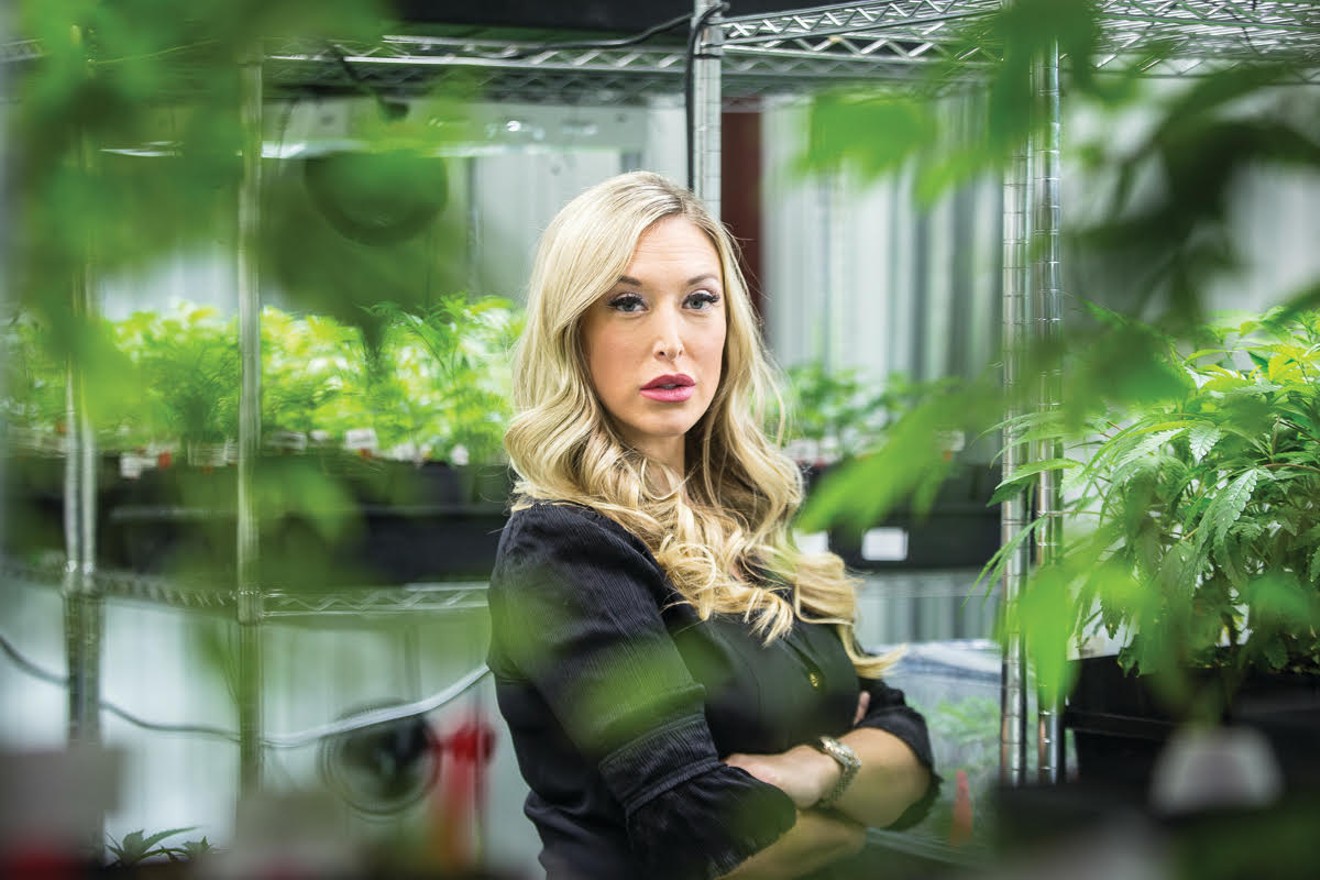Her business, Item 9 Labs, sells medical cannabis products to more than 35 dispensaries in the Phoenix metropolitan area. As part of a burgeoning national industry, it stands as one of multiple companies contributing to the medical marijuana market in Arizona — where it may only be a matter of time until recreational cannabis also becomes legal, according to a 2019 statewide survey of residents by polling company OH Predictive Insights.
Gullickson wore a flowing black gown that swept the floor, and expertly worked the private room at Blanco Tacos + Tequila in Biltmore Fashion Park. Her blond curls danced around her face as she laughed with her guests. Slyly, between glances at white name tags stuck to blazers and button-downs, she would occasionally check her watch. The corporate world has no time to waste.
She stepped before the crowd, and it was as if somebody flicked a switch. Nine years of industry experience and hundreds of speaking engagements had primed her for moments like this one. The hospitable hostess seemed to have been replaced with a pragmatic executive armed with nuanced talking points on market strategy and revenue projections.
Gullickson is on her way to cannabis-tycoon status, running a corporation currently valued at $300 million. She joined Item 9 Labs Corp last year after its founding in 2017 by Bryce Skalla, Mark Murro, and Andrew Poirier. She is the lone woman on her company’s six-person management team, and the only one on its five-person executive board.
“I had to claw my way to the top,” she said frankly one February morning, sipping a large iced coffee with a splash of cream. I had only made her acquaintance moments earlier, sitting at a table in La Grande Orange Grocery & Pizzeria in the upscale Arcadia neighborhood. The restaurant would serve as the backdrop for our occasional meetings, with patrons coming and going around us as we unraveled her life story.
Gullickson has had a challenging climb up the business ladder, without a lot of company. And the gender gap in her line of work is only widening. In 2015, women held 36 percent of the senior positions in the cannabis industry. Two years later, that number dropped to 27 percent, according to Marijuana Business Daily, a leading trade publication. That was almost the same rate of women in executive roles in traditional business sectors — 23 percent, according to Catalyst, a global nonprofit that works to advance women into leadership positions.
Still, throughout the United States, women are staking their claims in the marijuana industry and, in the process, building a sisterhood across state lines. Female growers, manufacturers, managers, and CEOs share a profound loyalty and have forged strong alliances — an effort at pushing the industry to return to its more egalitarian roots.
As a female cannabis executive, Gullickson’s rise in the industry was plagued with obstacles. Her identity as both a woman and an executive often spawns more questions than answers. How do women CEOs lift other women up if they tend to consider men better prepared and hire them more frequently? How do female leaders better recruit women to join their businesses? If most women in the industry feel supported in their entrepreneurial endeavors by the men surrounding them, then why should they work so hard to change anything?
“We’re expected to be so many things,” Gullickson said. “We’re expected to be nurturing. We’re expected to be beautiful. We’re expected to be sympathetic. We’re expected to be rational and smart. Women were supposed to be perfect, if you look at what their role was even 50, 60 years ago. So, it’s not abnormal that we project that perfectionism on ourselves.”
She does not mince words when it comes to society’s perception of gender: Sexism should not be used as a crutch and cannot keep women from pursuing their dreams.
Growth
Medical marijuana first was legalized in California with Proposition 215 in 1996, challenging the nation’s long-standing prohibition politics.Now, 11 states and the District of Columbia have legalized recreational marijuana. Medical marijuana is allowed in 33 states, plus Guam, Puerto Rico, and the District of Columbia. That, of course, includes Arizona, where voters approved a medical marijuana program in 2010. As of this year, nearly 200,000 patients participate in the program, served by about 130 dispensaries.
Being in charge of a growing marijuana business in Arizona wasn’t in Gullickson’s plans as she grew up in Minnetonka, Minnesota, but she’s not surprised at how she gravitated toward the industry. She described herself as an artistic “weird” girl in her younger days to whom a specific dream job never came to mind because, in her eyes, she didn’t fit into any established niches. Instead, Gullickson aimed to create her own reality. Years later, she succeeded.
Following in her older sister’s footsteps, Gullickson decided to leave Minnesota and make Phoenix her home. The city was young and hungry, like her. But she didn’t leave all of her roots behind — she still pronounces words like “room” and “tour” with a Midwestern lilt.
Gullickson finished her undergraduate degree in communications at Arizona State University, then went on to obtain a master’s degree in business administration and marketing at Keller Graduate School of Management. With rent to pay and a name to make, she plunged headfirst into the rapidly developing cannabis industry.
She’s proud of her academic accomplishments, but Gullickson credits hands-on experience as her greatest teacher. The first lessons began when she founded her cannabis consulting firm, Dispensary Permits, in 2010. Now an asset of Item 9 Labs, the company acquires medical marijuana business licenses for clientele nationwide, and offers business plans and dispensary training programs, among other services.
Gullickson’s first business trip to California resulted in zero sales and several dinner date invitations. She realized she had some adjustments to make if she wanted to progress in her field as a young woman.
She researched practices like business seating arrangements, and always made certain to claim her spot at the head of the table. Her limited knowledge of cannabis stemmed from high school experiences, so she absorbed all that she could on the subject. She studied business models and read up on entrepreneurial style. Apprehensive, but determined, she charged a designer suit and heels to her credit card.
Back then, Gullickson noticed the clients utilizing her services were almost always men. Today, the people showing up to her company’s job interviews are the same demographic.
“I sure hope that some of these women step up, because we just need more of that female energy in the industry and even in my own company,” she said. “I have hope that the industry will start to get back to where it was because, a couple of years ago, the media was all about women in the industry.”
Throughout her 20s, she missed birthday parties and gatherings with friends for business trips and project deadlines. But she doesn’t regret investing in her own success. She calls herself “the leading lady of cannabis.”
There are other leading ladies, but Gullickson’s boast is not too far off. She was listed as one of this year’s “Women to Watch” by Marijuana Business Magazine. Her profile was featured in Phoenix Business Journal and Herb Magazine. Arizona Foothills Magazine dubbed her an “Arizona Trendsetter.” And she’s spoken at multiple large-scale conferences, like MJBizCon, Women Grow Leadership Summit, and Cannabis World Congress and Business Expo.
Risk-Takers
Gullickson stole a glimpse at her iPhone and abruptly gathered her purse. “Oh, I’ve got to go,” she said, signaling that our second meeting together had come to a halt. We had spent an hour discussing different aspects of her life — her early years in business, the significance of a healthy lifestyle, her efforts to support and inspire other women. But she had an important appointment to keep: her monthly date with Lilach Mazor Power, the co-founder and managing director of Giving Tree Dispensary in north Phoenix.“There’s a special language that we speak,” she said about Power earlier in our conversation. “With Lilach, she’s been in a lot of the same positions that I’ve been in, and she’s made a lot of the same hard decisions.”
Power, 40, is not only a colleague and confidante of Gullickson’s, but is also one of the few women operating on the same professional level. She runs the only medical marijuana company in the state that also qualifies as a majority woman-owned business.
Power welcomed me into her world on an early February morning. The lobby of the Giving Tree Dispensary has gleaming tile floors and framed portraits of marijuana flowers. The building decor echoes her vision of what the industry should be, she said: professional, tasteful, sleek.
Dark hair spilling down her shoulders, Power exuded a palpable confidence in her domain. She’s the embodiment of the classic American dream. She said she feels her destiny revolves around entrepreneurship. She immigrated to the United States 12 years ago from Israel. There, she served as an Israeli Air Force sergeant and earned her bachelor’s degree in business administration at New England College in Tel Aviv.
She opened her Phoenix-based dispensary in 2013 with her partner, Dr. Gina Berman, who previously worked as an emergency room physician, and established a second location in Mesa soon after. They faced hurdle after hurdle in the “frustrating” cannabis industry, she said: the lingering stigma of cannabis, conflict with the community, lack of available resources, and financial burden. Power tried to stay focused on how they were making an impact by providing holistic medicine to those in need. And it’s worked out very well for the women, even though they ultimately severed their business relationship last year, with Berman staying at the Mesa location and partnering with Arizona Natural Selections.
Power has consistently networked with women leaders to bounce ideas off of each other as the business of cannabis has evolved in recent years.
“It’s definitely becoming more of the brotherhood of rich white men,” Power said. “So, women have less opportunities because [the men are] hiring their buddies and they’re promoting their buddies. And raising capital — because this is a very expensive business — is always harder for women.”
In the past, she and Gullickson have bonded over shared experiences in handling employees and corporate politics, all the while balancing commitments to family and friends.
The pair rely on each other as listeners. But, even more so, they relate on the complexities of their leadership roles, offering a unique understanding when their identities as both women and executives clash.
“I’m hiring a lot of higher positions now and it seems like women are still afraid of this industry,” Power said. “Women are not the risk-takers.”
Scientific studies apparently show that, in general, men are more inclined to take risks. Stress, for instance, pushes men toward risk-taking and women away from it, according to results of a study published in 2012 in the journal Current Directions in Psychological Science.
The Domain-Specific Risk-Taking Scale is the psychological standard traditionally used to measure the likelihood of participating in risky behaviors like bungee jumping, whitewater rafting and unprotected sex. However, some researchers are now challenging its accuracy, suggesting that the sampled risky activities are biased toward masculine stereotypes.
Men are simply more likely to take advantage of high-reward opportunities in the marijuana industry, Power said, adding that she would like to hire more women in her own company.
“I always think that, as women, we have lots of barriers in general,” Power said, “and I don’t think it’s an excuse to not do things. It’s challenging to be a woman. But, we’re also capable of much more, so you just go for it.”
Queens
There is no signage to let visitors know they’ve arrived at the Item 9 Labs’ growing facility, an unassuming warehouse tucked neatly into farm fields near Casa Grande, about halfway between Phoenix and Tucson. The only giveaway is the odor of marijuana that permeates the fresh, rural air, refusing to be ignored. A welcome mat that reads “This is our happy place” brightens the mood of the dimly lit reception area.On this warm Friday afternoon in April, several employees enjoyed their lunches outside of the facility before shuffling back into the building to resume their workdays. For five women in medical scrubs, that meant taking their seats at a long plastic table and donning black rubber gloves before returning to the duty of trimming cannabis buds. The women are all city locals who were hired by the company over the past three months. A whiteboard on an adjacent wall announces the strains of a recent harvest: “Alien Fire Fruit,” “Orange Cookies,” “Lake of Fire,” “Tres Leches.”
Gullickson, flanked by male executives, enters the workspace as the women snip and shape the buds. A gold marijuana leaf charm with a small diamond inset dangled from a chain around her neck, catching the fluorescent light inside the former warehouse.
Next to her was Chris Wolven, the 37-year-old chief operating officer for Item 9. He’s been with the company since January, but Gullickson said he understands the inner workings of the facility, nicknamed the “farm,” better than anyone. Casually dressed, he led the way through the labyrinth of indoor grow rooms.
Each one hosted countless strains of flowering plants in different stages of maturity, with a single element in common — they’re all female.
Several feet above, on a perch of their own, a collection of mother plants stretched their stems toward the ceiling.
“They’re the queens of the building,” Wolven said.
“They’re on their pedestal up there,” Gullickson added.
What’s not to love about the marijuana industry, from Gullickson’s point of view? It combines her love of world travel with the addictive rush of competition in uncharted business territory, all while providing consumers with alternative healing methods. But for a woman, there will always be more challenges.
As she explained the tight lighting schedule her facility follows to mimic photosynthesis for the crops, her hands lingered on her pregnant stomach.
On May 16, Gullickson delivered her first child, a boy named River. This brand-new adventure for the executive and her partner is unnerving. But if any woman is ready to care for a newborn while helping to run a $300 million cannabis company, it’s Gullickson.
Correction: Lilach Power has not been previously affiliated with the advocacy group Women Grow.














